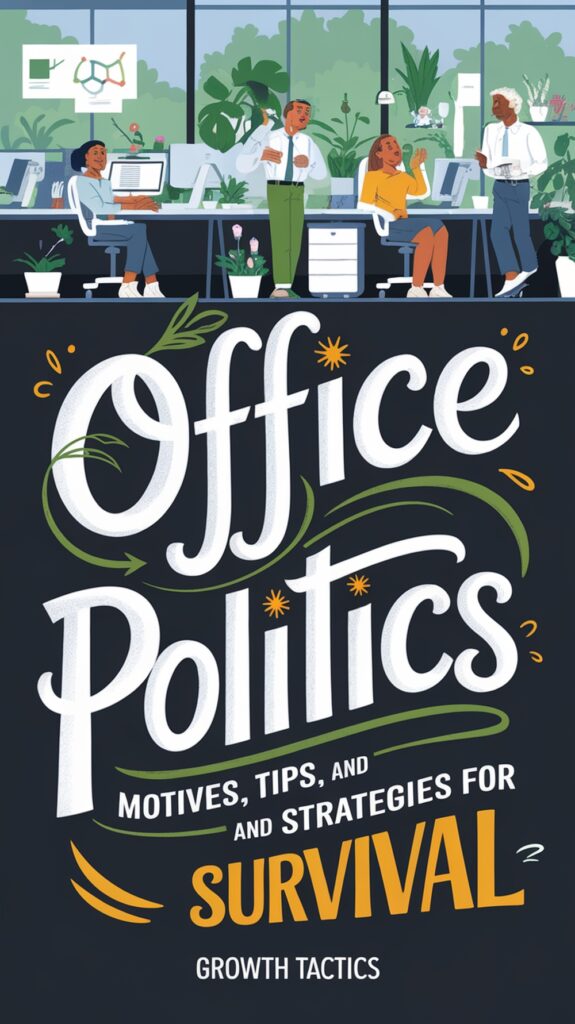Has office life sometimes felt more like a minefield than a team effort? Office politics can be toxic, with mixed agendas, power plays, and rivalries that undermine collaboration and efficiency.
This article will explore how to navigate this environment. I will be providing you with actionable advice and wisdom on turning office politics into the rocket fuel for growth and collaboration.
Jump To Section
What Is Office Politics?

Office politics is the unofficial dynamic of influence and power in the workplace. It’s present in just about any organization, propelled by the various personalities, ambitions, or power structures at work. Office politics, although sometimes a source of teamwork and creativity, can breed manipulation and mistrust.
At its core, office politics is about gaining resources and being on the right side of the decision makers. It affects decision-making and the allocation of resources and advancement.
Office politics isn’t always bad. Positive things, such as advocating for group projects or resolving disputes, can foster cooperation and mutual respect. On the other hand, spreading rumors and sabotaging others can decimate morale. What differentiates “good” and “bad” office politics is often a matter of intention and/or results.
Why Do Office Politics Exist?
Ambition, competition, and self-preservation are human motivators that naturally lead to office politics. When resources are scarce, whether it’s promotions, budgets, or recognition, people become political to get their share.
How Office Politics Shapes Workplace Dynamics
When taken in a positive spirit, it generates teamwork and comradeship, preparing the soil for creativity. When politics get divisive, it can generate silos, distrust and bitterness between co-workers.
They impact morale and productivity. In fact, a Gallup study found that 42% of employees who are frequently exposed to office politics are disengaged. Notions of fairness and trust erode depending on how politics are managed.
Early Warning Signs of Political Tensions

Red Flags of Office Politics
Identifying the first hints of office politics can save you headaches later on. Here are some key indicators to watch for:
- Formation of Cliques: Small groups of employees that operate in isolation, often excluding others from discussions or decisions.
- Gossip and Favoritism: The spread of rumors and preferential treatment can create an environment of distrust and resentment among team members.
- Frequent Arguments: Ongoing conflicts, whether overt or subtle, such as snide remarks or passive-aggressive comments, can signal underlying political tensions.
- Changes in Communication: A noticeable drop in open dialogue or collaborative efforts may suggest hidden agendas or secretive behavior among colleagues.
- Exclusion from Meetings: Being left out of key discussions or decision-making processes can erode trust and hinder teamwork.
- Shifts in Team Dynamics: An abrupt change in how team members interact, such as increased hostility or withdrawal, may indicate growing political divides.
- Lack of Transparency: If information is not being shared openly, it could point to manipulation or power struggles within the team.
Awareness of these red flags can go a long way towards limiting the damage caused by office politics and encouraging a cooperative work culture.
Common Types of Political Behaviors
There are many different types of political behavior to look out for, some more obvious than others. Backstabbing and credit-stealing are classic examples, eroding trust and morale. Rumor-spreading is yet another political tool that some people employ.
Less obvious acts range from strategic withholding of vital information to accentuating issues of others for personal status gain. Though actions such as casual networking may appear innocent, it all comes down to the intent behind them.
Distinguishing Networking from Manipulation

Networking is cooperative, founded on reciprocity and genuineness, whereas manipulation is self-serving, frequently to others’ detriment.
Transparency and honesty are hallmarks of real networking. Manipulation often entails deception, abuse, or fostering a misplaced sense of trust. Below is a comparison:
Networking | Manipulation |
|---|---|
Transparent communication | Withholding information |
Mutual benefit | Self-serving motives |
Builds trust | Exploits others |
Authentic relationships | Superficial connections |
By recognizing these differences, you can engage meaningfully without falling into damaging traps.
Types of Office Politicians
Knowing typical archetypes of office politicians and their strategies is crucial to handling them in a productive manner that steer clear of unproductive feuds. Here’s a few of the most common types and how to handle them.
The Micromanager
Micromanagers feed on dictating minutiae, frequently countermanding their team’s judgment and sabotaging independence. Their control freakiness usually is rooted in insecurity or lack of trust and they feel the need to micro-manage even the tiniest of responsibilities. Even though they are typically well-meaning, creativity gets squelched, morale gets damaged, and employees end up feeling like cogs in a machine.
Manage a micromanager by building trust. Preemptively check in with them on progress and request a definition of expectations. For instance, if you have a micromanager who wants to interrogate every decision, provide frequent updates, and solicit input ahead of time to stave off their snooping.
The Credit Stealer
Credit thieves are the ones who will consistently steal credit for other people’s work. Typically, to get on the good side of higher-ups and promote their career. This type of behavior destroys trust among teams and breeds bitterness. It causes good employees to feel unappreciated and invisible.
To deal with a credit stealer, you need to track your contributions. Note milestones and report progress to the right people. If someone steals your thunder, respond diplomatically by highlighting the team: “I’m just glad my idea helped advance the project”. If the behavior continues, bring in a supervisor or HR.
The Scapegoater
Scapegoaters push blame outward to shield themselves, turning your office into an incinerator of accountability. Their behavior can cause suspicion and blame-shifting, undermining group solidarity. It’s particularly destructive, a study by Insight Global found that 85% of the employees surveyed prefer no office politics.
Handling a scapegoater professionally can be tough, but there are some things you can do. Don’t get emotional, rely on facts to resolve the misunderstandings. For instance, maintain decision and outcome logs for accountability purposes. When you discuss the issue, be cool and concentrate on solutions, not blame.
The Manipulative Flatterer
Flatterers douse you with honeyed words to please or manipulate you, frequently turning on their wit to captivate their bosses. Though their behavior seems harmless, it can breed division and favoritism and make others feel left out or less appreciated.
Dealing with a manipulative flatterer requires a strategic approach to maintain your integrity and ensure a healthy work environment. First, be aware of their tactics. Once you know flattery is a tool of manipulation, you can stay objective. Accept their statements, but don’t allow them to influence your choices or feelings.
Create an environment in which candid feedback is appreciated more than flattery. Finally, build relationships with co-workers who value genuineness because this will establish a support network that combats the effect of manipulative flattery and supports a more authentic office environment.
The Information Hoarder
Information hoarders withhold key data in an effort to retain power, sabotaging collaboration and ultimately, slowing down productivity. Their behaviors tend to emerge from a need to stay necessary or powerful.
Here are some tips for dealing with an information hoarder. Cultivate a trusting culture where information-sharing is appreciated and incentivized. Foster frequent check-ins and joint projects that require the sharing of information, making it more difficult for people to hoard crucial data.
If you meet resistance, confront it head-on in a non-aggressive way, highlighting that this openness is beneficial to the team’s success. Promote collaborative tools that make information access communal. By fostering responsibility and common goals, you can slowly diminish the power of info-hoarding.
Motives Behind Office Politics

By comprehending the motives behind these behaviors, you can address their cause and cultivate a healthier workplace. Let’s discuss some of the more common motives.
Jealousy and Insecurity
A sense of insecurity will drive people to undercut others. If a co-worker is seen as more capable or preferred, jealousy can arise. Which can spark activities like backstabbing or sabotaging. This negativity erodes team spirit, breeding an atmosphere of suspicion.
You must recognize and deal with insecurity. For instance, simply publicly recognizing individual contributions can make staff members feel appreciated. If you build a culture of support, where accomplishments get celebrated and skills are honed, jealousy is less likely to take hold.
Ambition and Self-Preservation
Career ambitions occasionally ignite one-upping or conniving behavior. Ambition isn’t bad per se, but when taken too far, it can make people behave in destructive ways, like hoarding information or tearing down colleagues. There’s a fine line between healthy ambition and toxic self-preservation.
Companies can alleviate this by establishing definite, equitable objectives for promotion and establishing open paths to achievement. For example, a team that emphasizes collaboration rather than cutthroat competition nurtures each other’s growth. By aligning individual ambitions with team objectives you make sure everyone is working toward shared success, not just their own.
Resource Competition
Scarce resources, like budgets, time, or opportunities, often ignite friction. This scarcity can breed competition, as employees compete for what they need to do well. This kind of competition can break apart teams and cultivate resentment between employees.
Fair resource allocation is essential. Transparency is also key. When employees know how decisions get made, it reduces suspicion. Redirecting your energies away from personal agendas and toward group priorities can help defuse tensions. Leaders who lead by example define the trend.
Personal Grudges and Vendettas
Unaddressed conflicts often fester into personal grudges that poison office relationships and drain productivity. Rumors tend to stoke these fires, transforming small-scale conflicts into all-out wars.
Conflict resolution training can keep issues from escalating. Encourage open dialogue and a culture of forgiveness.
How to Deal with Office Politics in the Moment
Navigating office politics in real time can be challenging, but with the right strategies, you can address situations effectively while maintaining professionalism and your peace of mind. Here are some practical steps to navigate these dynamics in the moment.
Stay Calm and Assess the Situation
When things get heated, take a step back and reflect. Reacting impulsively can inflame a matter unnecessarily. See what’s going on, who’s involved, what is being said, and the context.
For instance, if a coworker steals your thunder in a meeting, pause to evaluate if it was purposeful or, did they not even realize they were doing it. Get at facts, not interpretations, and find the root cause.
Is this a pattern? Are outside pressures at work? Don’t simply respond based on rumor or assumption. This can fog your thinking and exacerbate the condition.
Address Issues Directly and Professionally
Once you’ve sized up the scene, confront the participants politely. Keep the communication straight and honest. For example, in a situation where a colleague sabotages your work, defuse it by politely asking for a private discussion.
Use ‘I’ statements, like, “I felt overlooked during the presentation when my contributions weren’t mentioned.” Don’t use ‘you’ statements, which tend to put others on the defensive.
Focus on solutions: propose ways to collaborate better moving forward. Document these conversations, particularly if the conflict is recurring, to build a clear record should the need for escalation arise.
Build Trust and Genuine Alliances
Office politics flourish when trust is thin. Fight this by building genuine relationships with peers across departments and hierarchies. Dependability breeds reputation; when you deliver, people pay attention.
For example, volunteering to help on cross-departmental projects can build relationships and demonstrate team spirit. When possible, make your actions transparent, like openly giving credit to others when it’s due. This builds goodwill and makes you a trusted colleague.
Avoid Gossip and Maintain Integrity
Office gossip might seem like a good way to connect with co-workers, but it destroys reputations and feeds toxicity. So refuse to play it.
Instead, steer conversations toward something constructive, such as upcoming projects or team objectives. Remaining neutral not only sets a good example but reinforces your professionalism.
When you concentrate on facts and avoid rumors, you safeguard your reputation and contribute to a more positive workplace environment.
Seek Support When Necessary
Other times, you need outside assistance to deal with office politics. Trusted mentors or colleagues can provide useful advice. For more serious matters, like harassment or toxic behavior, bring in HR or a neutral third party to mediate.
Strategies for Managing Office Politics as a Leader

Navigating office politics as a leader requires long-term strategies for cultivating a healthy workplace. By emphasizing transparency, collaboration, and fairness, leaders reduce friction and develop healthier, more collective cultures.
Promote Transparent Communication
Clear communication minimizes confusion and fosters trust throughout an organization. As a leader, you should facilitate open discussion where employees feel comfortable voicing concerns or suggestions. Use your regular team meetings as an opportunity for updates, feedback, and potential conflict resolution.
Information sharing as a leader is just as critical. When decisions are made behind closed doors, it breeds suspicion and fans the flames of the rumor mill. By transparently defining decision-making procedures and standards, leaders can steer clear of unnecessary ambiguity.
Consider these tools and practices:
Tool/Practice | Purpose | Example |
|---|---|---|
Open-door policy | Encourages approachability | Managers available for drop-ins |
Team collaboration software | Centralizes communication | Platforms like Slack or Asana |
Anonymous feedback channels | Gathers honest input | Suggestion boxes or online surveys |
Focus on Team Goals Over Individual Agendas
Office politics thrive when personal agendas trump collective ones. Leaders should focus on directing individual efforts towards group goals. Clear goals not only eliminate competition but also align everyone.
Acknowledging team successes can strengthen solidarity. For instance, marking milestones with group recognition, such as an email shoutout or a team lunch, demonstrates that cooperation is appreciated. Clear expectations around roles and responsibilities help prevent conflicts over priorities, smoothing out the workplace.
Provide Conflict Resolution Training
Conflict is unavoidable; how it’s handled is what counts. Providing training in active listening and empathy gives your employees the tools to address internal disagreements in productive ways. Role-playing, for instance, can mimic real-life situations, allowing teams to rehearse assertive communication.
Continuous training keeps employees flexible to changing dynamics. By normalizing healthy conflict resolution, leaders make politics less poisonous.
Foster a Culture of Fairness and Collaboration
Leaders determine the vibe of their work center. By role-modeling fair treatment and confronting favoritism, they build trust.
Anti-discrimination policies combined with frequent reviews make accountability stick. Collaboration flourishes when fairness takes center stage, drowning out the echoes of office politics.
Conclusion
Office politics can seem like a maze, but with the proper mindset and tactics, it’s completely controllable. By understanding the dynamics at play, recognizing different types of political behavior, and keeping clear on the motives behind it, you can approach these situations with confidence, not frustration.
It’s not about “winning” office politics, it’s about making a world in which cooperation flourishes and trust is the currency. Each encounter is a chance to set the standard, connect with honesty, and cultivate a brand of dignity.

Frequently Asked Questions
What is office politics?
Office politics is the behind-the-scenes strategies people employ to gain power or influence. A lot of it is about relationships and navigating office politics.
How can I recognize political behavior in the office?
Political behavior involves gossip, favoritism, information hoarding, or even alliances. Observe the decision making processes and colleague dynamics.
Why do people engage in office politics?
Individuals practice office politics to obtain authority, notoriety or influence. Sometimes it’s just plain self-interest–a desire to get ahead, or keep their position safe.
What are the negative impacts of office politics?
Office politics can be stressful, demoralizing and damaging to team productivity. It can result in fights, suspicion and a toxic workplace.
How can I handle office politics in the moment?
Remain calm and professional. Don’t respond with emotion. Be fact-based, clear and not inflammatory.
What are some strategies for managing office politics as a leader?
Promote openness, respect, and dialogue. Establish behavioral expectations. Confront disputes at the outset and encourage a spirit of cooperation.
Can office politics ever be positive?
Yes, when applied ethically, office politics can be used to cultivate relationships, teamwork and opportunities. It’s all in how you take it.

